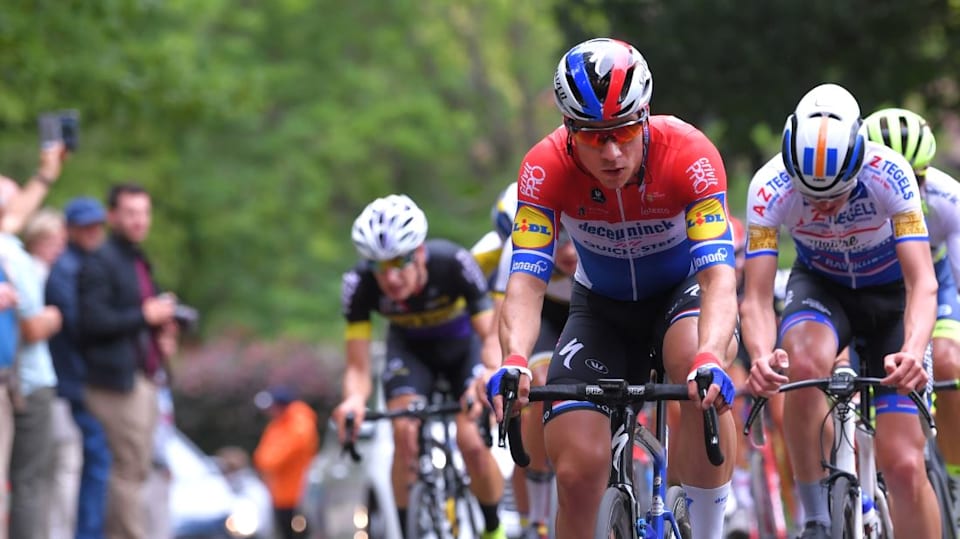
In a world that is in need of good news, Fabio Jakobsen’s Monument cycling debut at Milan-San Remo on Saturday (19 March) was just that.
The Dutch sprinter, who almost lost his life in an horrific crash at the Tour de Pologne in 2020, wasn’t even supposed to be racing in northwest Italy last week.
He only drove to the city to watch the final 60 kilometres as a non-competing Quick-Step Alpha Vinyl Team member.
But it was a stroke of luck for him, and the team, that he did.
Three days before the event, world champion Julian Alaphilippe contracted bronchitis, and Jakobsen was called up to take his place in one of the world’s most prestigious one-day races.
"It's special. And it makes me lost for words sometimes because I'm just enjoying being a pro cyclist again and I went step-by-step,” the 25-year-old told Cycling News after his selection. “It's one of the races that, as a sprinter, you would dream about.
"To be here, it's just amazing and for sure, I will be enjoying it - probably not when we hit the Cipressa or Poggio, but in between, I'll be happy on the bike, and that I'm able to race here and try to make something of my first Monument."
In the end he finished 86th, 6 minutes off the winner. But his journey to get there, the last-minute nature of his debut, and his broad smile on the road afterwards told their own story.
How Fabio Jakobsen burst onto the cycling scene
Born in Heukelum, Netherlands, Jakobsen was always destined for big things.
For starters, he was named after 1992 Olympic champion Fabio Casartelli, a star of the sport, who tragically died at the 1995 Tour de France.
Jakobsen announced his arrival at Dutch cycling’s top table in 2016 with victory in the National Under–23 Road Championships.
A year later, he defended that title and added a slew of domestic road race stage victories to his increasingly well-known name in cycling circles.
In 2019, the Quick-Step Floors rider became the Dutch road race national champion and made his Grand Tour debut at the Vuelta Espana.
But his progress came to an abrupt halt.
In August 2020, he suffered a terrible crash at Tour de Pologne that left him with a fractured skull, broken nose, facial lacerations, almost no teeth, and required him to be placed in a medically-induced coma.
“Yeah, it doesn’t look too bad. I still have sort of a harelip where I hit the billboard and my nose looks like I was just in a fight with Mike Tyson,” he said of his injuries during a lengthy rehab.
“There’s eighty stitches in my palate alone. They have taken bone tissue from the pelvis and put it in my jaw. I get implants in my jaws to reconstruct my teeth. That process will take a while. Next fall I’ll have my teeth again.”
Overcoming fear
That Jakobsen was still alive was a minor miracle of modern medicine, which made the next part of this story so incredible.
With a resolute mindset, he got back on the bike and was racing again by 2021.
“We can all say this is the end of my comeback,” he said after making his competitive return. “While the accident will always be part of my life, now I can put it behind me and go again for the sprint finishes, because that’s what I’m good at.
“After the surgery, the first thing was the physical part and becoming a normal person once again, and then afterwards, the road back to professional cycling started, both physically and mentally. That goes hand in hand."
“In the first races, I was of course a bit scared in bunch sprints because it’s hectic, the speed is high and there’s always the possibility of a crash. But once I knew I was ready on a physical level, then I could test if I still had it mentally.” - Fabio Jakobsen to Cycling News.
Soon enough the fearless rider found his grove.
Far from proving he could still race, Jakobsen took his game to a whole new level, producing the most sensational riding of his life to win the 2021 _Vuelta a Espana points classification victory.
_
Fabio Jakobsen's new priorities
While the Dutch rider is fully focussed on his cycling career once more, there is no escaping that his crash changed him fundamentally as a person.
The days spent in the intensive care unit, coupled with the love and attention he received during rehabilitation meant that his priorities shifted.
“I have counted my blessings in the ICU. Whenever Delore [his partner] and my parents had visited, tears would roll down my cheeks. I’d think about my loved ones, people I know,” he said.
“You realise that everything is finite, that things can end just like that. Delore and I had plans to move to Monaco. One of the first things I said when I got a cannula that enabled me to speak was: ‘We’re not going to do that. I want to stay close to my parents, my sister, my in-laws, my friends, I want to be able to visit my grandmother and grandfather whenever I feel like it’.
“My relationship with Delore has become even better since we went through this ordeal together. In a way, it has become unconditional.”
Armed with a new outlook on life, it looks like the best is yet to come for the Flying Dutchman.
